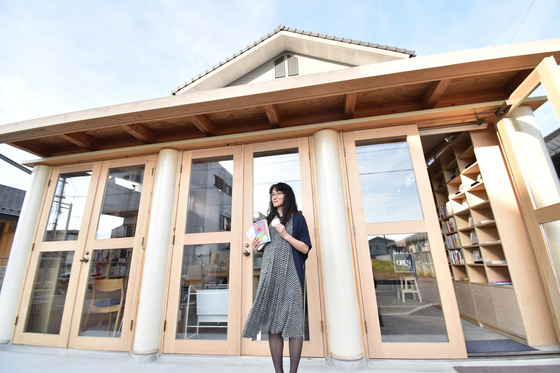“Time does not pass”’
Ueno Station Park Exit to the National Book Award
Moved to Fukushima 6 years ago, opened a bookstore
“It’s like me, the root of the people’s pain”
When I asked for a signature for the novel “Ueno Station Park Exit (Original Title: JR上野駅公園口)”, writer Yumi-ri (53) wrote this phrase. He said it was his impression of commemorating the 10th year of the Great East Japan Earthquake. Just because time passed, it means that the pain and sadness of the time did not fade or lighten.
Yoo, a Korean resident in Japan, has been living in Minamisoma City, Fukushima Prefecture since 2015. It is only 16km away from the Fukushima Daiichi Nuclear Power Plant. When everyone left Fukushima for fear of radiation damage, he came on his own feet.
![Writer Yoomi-ri, a Korean resident in Japan, stands in front of the bookstore'Full House' operated in Minamisoma City, Fukushima Prefecture. [사진=지지통신]](https://i0.wp.com/pds.joins.com/news/component/htmlphoto_mmdata/202103/12/712b28cc-1fb2-4778-be51-bd61be53d62e.jpg?w=560&ssl=1)
Writer Yoomi-ri, a Korean resident in Japan, stands in front of the bookstore’Full House’ operated in Minamisoma City, Fukushima Prefecture. [사진=지지통신]
At an interview hosted by the Japan Foreign Correspondents Association (FCCJ) on February 25, he said, “There is a difference between the war and the nuclear power plant. “He said. His parents smuggled into Japan on a small fishing boat to escape the Korean War. My father, who was a pachinko-up, and my mother, who was a cabaret host, divorced as a child, and were always the targets of bullying at school. He, who was treated as a’minor among the minors’ of Koreans and women in Japan with his junior high school graduation, defines his identity as “Neither Korean nor Japanese.”
The decision to enter Fukushima was triggered by appearing on the Temporary Disaster Broadcasting Station in 2012, the year after the earthquake. It was a decision made after listening to the stories of over 600 residents once a week for 30 minutes.

Artist Yoo Mi-ri wrote her name in Korean. When asked about “Impressions of the 10 Years of the Great East Japan Earthquake,” he said, “Time doesn’t pass.” Correspondent Yoon Seol-young.
“I thought I would appear for about a year, but as I tried to keep my promise to do it until the end, it continued for 7 years until 2018 when the temporary broadcasting station closed. I hear stories of pain and sorrow, and it hurts to live in a safe metropolitan area. Suddenly, their emotions permeated my body, and I had the experience of becoming a vessel for accepting sadness.”
This experience completely changed the world of novelist Yoo Mi-ri’s work. If you have been writing novels based on your own experiences, such as’family cinema’ (awarded the 1997 Akutagawa Prize), now you are looking into a wider range of social issues. The Ueno Station Park Station Exit, which won the National Book Award, the highest prestigious award in the United States at the end of last year, is also a protagonist from the Tohoku region, which was hit by the Fukushima nuclear power plant accident. It tells the story of the Tokyo Olympics construction site in Tokyo to make money, but the misfortunes resulted in becoming a homeless.
Artist Yoo expressed his dislike for the Tokyo Olympics being treated as a symbol of the Tohoku region’s revival. He said, “The revival Olympics are just signs, and they don’t actually contribute to revival. Rather, they are hindering the revival.”

Korean writer Yoo Mi-ri, who won the National Book Award through the’Ueno Station Park Exit’, is signing his book after a press conference hosted by the Foreign Correspondents Association (FCCJ) on February 25. Correspondent Yoon Seol-young.
“In the end, it is the homeless people brought from Okinawa, where the minimum wage is cheap, that is put into the radioactive decontamination work. Even if you die from diabetes, alcoholism, cirrhosis, etc., your real name is different and you can’t even identify yourself. There is a situation where the remains are kept at a temple in the village because the bereaved family cannot be found.”
The next work is about these workers. This is the sixth work in a series of series titled the name of the station on the JR Yamanote Line. The homeless man and the worker who are the main characters of the’Ueno Station Park Exit’ have a corner that resembles somewhere.
“Just as if I meet a homeless person on the street, I don’t look at it, so I don’t face face to face with workers. The face is invisible because it is labeled as a worker. I want to do the work of removing the labels for each one of them. I think it’s a novelist’s job to give back names to people at the bottom without a name.”
The pandemic caused by the new coronavirus infection (Corona 19) has relentlessly penetrated the weak gaps of the residents of Fukushima. Artist Yoo said, “After the emergency declaration was made, suicide, loneliness, and starvation have followed. If the relationship is thin, it seems that people will die.”

Miri Yoo, a Korean writer in Japan, who is a recipient of the National Book Award, speaks at an event held at the Foreign Correspondents Association (FCCJ) in Tokyo, Japan on February 25. Yonhap News
The bookstore’Full House’ and small theater, which opened right next to the house three years ago, are shining in the pandemic. It became a love room in the neighborhood so that the residents said “Mirisang (Miri)~” without hesitation.
“I saw a middle school girl reading a philosophical book about Auschwitz. Those who survive earthquakes, tsunamis, and nuclear accidents are guilty of themselves. That’s why I keep thinking about life and death. I think there is room for art and culture to bloom here. I want to look forward to it.”
Tokyo = correspondent Yoon Seol-young [email protected]
![]()
